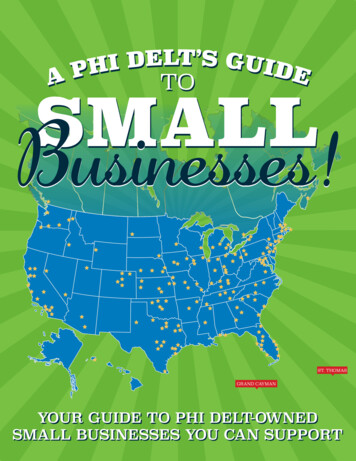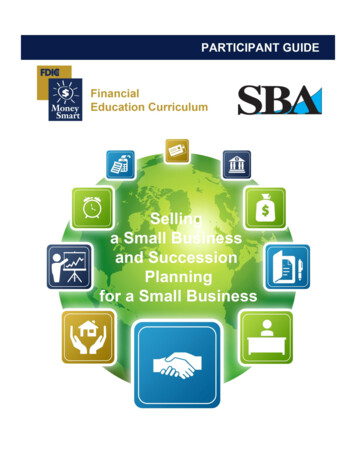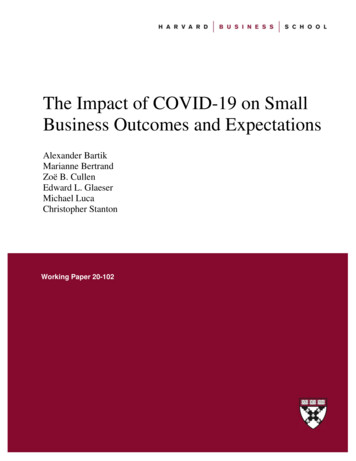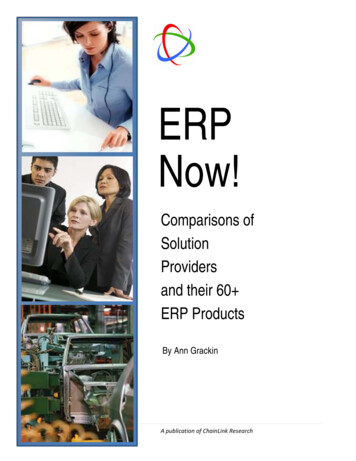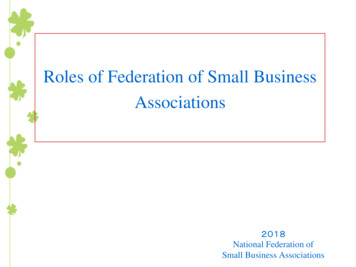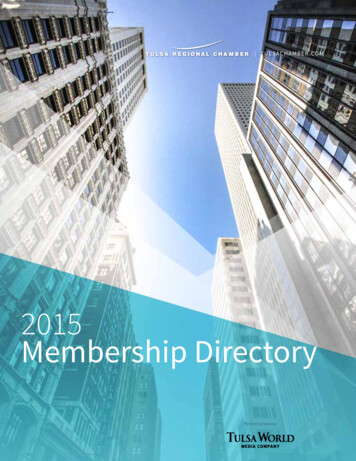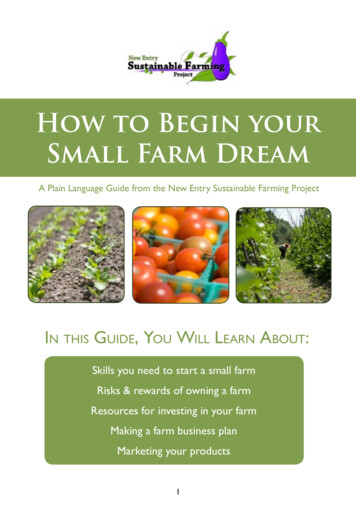
Transcription
How to Begin yourSmall Farm DreamA Plain Language Guide from the New Entry Sustainable Farming ProjectIn this Guide, You Will Learn About:Skills you need to start a small farmRisks & rewards of owning a farmResources for investing in your farmMaking a farm business planMarketing your products1
New Entry Sustainable Farming ProjectAuthored by Michelle HughesContributing Authors: Kate Granger, Jennifer Hashley, Catherine Owenswww.nesfp.orgMay 2010Boston Office:New Entry Sustainable Farming ProjectTufts UniversityGerald J. and Dorothy R. Friedman School of Nutrition and Sciency PolicyAgriculture, Food and Environment Program150 Harrison StreetBoston, MA 02111(617)636-3793Lowell Office:New Entry Sustainable Farming Project9 Central Street, Suite 402Lowell, MA 01852(978)654-6745A Plain Language Adaptation of:Exploring the Small Farm Dream: Is Starting an Agricultural Business Right for You? 2004, A publicationof the New England Small Farm Institute---adapted with permission http://www.smallfarm.orgFor additional information regarding this document, please email: nesfp@tufts.edu, or call(978)654-6745. This document is available in electronic format or as a printed copy. Thelatter may be obtained by contacting NESFP at the above locations. Please contact NewEntry for permission to use any part of this document for educational purposes.Production of this document was supported by the SARE Professional Development Grant ENE05-092, USDACSREES 2501 Program, and by USDA Risk Management Agency (RMA Partnership Agreement No. 06IE08310159).“In accordance with Federal law and US Department of Agriculture policy, this institution is prohibited from discriminatingon the basis of race, color, national origin, sex, age, or disability. To file a complaint of discrimination, write USDA, Director,Office of Civil Rights, Room 326-W, Whitten Building, 1400 Independence Ave SW, Washington, DC 20250-9410.Or call (202)720-5964. USDA is an equal opportunity employer.”NNIFPi
The Producers of this GuideNESFPNew Entry began in 1998. New Entry is one of the first initiatives nationwide toassist immigrants and refugees to develop commercial farming opportunities. Ourwork focuses primarily in the Lowell and Worcester sections of Massachusettsbecause of their population makeup, a strong interest in agriculture amongimmigrant and refugee residents, and the support of community organizations.The mission of the New Entry Susatinable Farming Project (New Entry) is to assistpeople with limited resources who have an interest in small-scale commercialagriculture, to begin farming in Massachusetts. The broader goals of New Entryare to support the vitality and sustainability of the region’s agriculture, to buildlong-term economic self-reliance and food security among participants and theircommunities, and to expand access to high-quality, culturally appropriate foods inunderserved areas through production of locally-grown foods.Purpose of this GuideWho should read this guide?This guide is written for people who want to own a small farm. Owning a farm can be agood thing for many people, but is not right for everyone. There are many things to consider before going into business for yourself. This guide will help you think about the benefits and challenges of owning a farm before you begin, and will introduce you to servicesthat will help you put your farm dream into actionYou will benefit from this guide if you: Know how to farm and want to own a farmLive in the Northeast U.S.It may be helpful for you to use this guide with an experienced farm owner and/or a staffmember from a farm service organization, as well as with friends and family who can helpyou to see the benefits and challenges of owning a farm from different points of view.New entry provides services for beginning farmers such as locating farmland,education, training, business/enterprise development, and production and marketingassistance.The project provides opportunities for disadvantaged farmers, preservesfarmland, and promotes New England agriculture.NESFIWe at NESFP are grateful for the work of The New England Small Farm Institutein putting together the orginial version of this workbook, Exploring the Small FarmDream: Is Starting and Agricultural Business Right for You? Thank you, NESFI, for givingus the opportunity to adapt your workbook so that we may provide more focusedassistance the populations we serve!NESFI is a non-profit educational organization. Their mission is to promote theviability of the New England region’s small farms. Founded in 1978, they developand deliver innovative, farmer-guided programs and provide information andassistance to aspiring, new and developing farmers. They advocate for new farmersand sustainable small-scale agriculture, and seek to develop program deliverypartnerships with agricultural service providers throughout the Northeast. NESFIis located in central Massachusetts on Lampson Brook Agricultural Reserve, a 416acre publicly-owned farmstead that is designated as a National Historic Registercultural landscape and is managed as a small farm development and training center.iiWhat is Plain Language?This guide is presented in a format called Plain Language. Plain Language providesclear, simple, and accessible text for readers in order to reduce misunderstandings,errors, complaints, enquiries, and lack of comprehension. It also helps guide you throughaction steps to do what you learn, and gives examples of other people practicing theinformation. We present this guide in Plain Language in order to make it accessible toeveryone.iii
Contents1. Describe your Small Farm Dream.Page 12. Risks and Rewards of Owning a Farm Business.Page 43. How are Your Farming and Business Skills?.Page 74. How to Make Decisions for your Farm Business.Page 115. Personal Household Expenses and Non-Farm Income Sources.Page 146. Opportunities and Challenges in the Farming Landscape.Page 197. Interview a Farmer.Page 228. Marketing your Farm’s Products.Page 269. Where Can you get Money to Start your Farm Business?.Page 3110. What do you Need to Start your Farm?.Page 3311. Start your Business Plan.Page 36Describe Your Small FarmDreamEight Questions to Get you Going!Ask yourself these questions before you begin:Do you really want to be a farmer?What does the farm of your dreams look like?What does being a farmer mean to you?If you can put your farm dream into words right now, go ahead and do it! However, if youare like most of us, you probably need help to figure out exactly what your dream farmlooks like. This workbook will help you to do just that. Answering the questions below isyour first step. Try to answer as many as possible. Don’t worry if you can’t answer someor feel like you need more information.This is the beginning of a process. At the end of theworkbook, you will be asked similar questions again when you have more information.Thegoal here is to start to think about your goals, strengths, and weaknesses, and to put downa basic idea of your dream on paper. On a sheet of paper, write down the answers to theeight questions below to get you thinking about your farm dream. If you need to, sit downwith a staff member or someone you trust to work through these questions together. Becreative and don’t be afraid to think big about your small farm!Picturing your Dream: What and Why?1. Why do you want to start a farm?2. What do you hope to gain for you and your family by starting a farm?3. What type of farm business do you want to start?Keep in mind that one farm may have several businesses. Think about what types of businesses would work well together in terms of your time and income throughout the year.iv1
Describing your Small FarmDream (continued)One Grower’s StoryMarketing your Products: Who and How?4. How do you want to sell your products?5. Who are your customers?Will your customers be from a specific neighborhood or cultural background? Will theybe willing to pay more for a special product, or will they want to pay less for morefamiliar products? You may wish to market your products at farmers’ markets, through aCSA (Community Supported Agriculture) model, or to restaurants or small stores. Be asspecific as you can when thinking of who your customers will be and how you will reachthem.Growing Roots with your Farm and Family: Where and How?6. How will your farm business fit in with the rest of your life?7. How will you involve your family and friends in your farm business?8. Where do you want your farm to be located?Think of how your farm will fit into the rest of your life. Think about the products you willproduce and what type of soil or land will be best to produce them on. Think about theamount of labor your farm will require: will your family and friends work on the farm? If so,ask them how many hours they are willing to put in, and think about what each person’srole should be. Think of transportation costs. How close do you want your farm to be toyour market? What services do you want to have access to at your farm?2Diversifying Your IncomeLee and Amy have three businesses on their farm--they raiseorganic vegetables, run a bed and breakfast, and lead tours of theirfarm for local school groups.Lee and Amy moved to New England from Vietnam. Thevegetables they produce and sell at a Boston-area farmers’ marketare used in traditional Vietnamese cooking and may be unfamiliar tomany typical American shoppers. The farmers’ market they attendhas many immigrant shoppers, and they are able to target theirproducts both to these immigrants and also to small Asian grocersand restaurants.Between marketing their products at weekly farmers markets,transporting produce to their commercial customers, giving schooltours and meeting the needs of their Bed and Breakfast visitors,during most seasons of the year Lee and Amy do not have muchtime to manage their finances. Before beginning their farm business,they asked Lee’s brother Tony, who is an accountant, to managetheir finances.3
Rewards & Risks of Owning aFarm BusinessHaving a farm can be fun and scary at the same time. You can be your own boss,you are able to work outside, and you make your own decisions. Farming can alsobe risky. You might injure yourself or lose money. You have to pay your own taxesand health insurance. Your crops may not grow or your animals may be unhealthybecause of bad weather.What do you like about the idea of having your own business? Below aresome examples to help you think about what makes it fun to have yourown farm. Use the next page to fill in your own ideas.-Be your own boss-Work outside-Set your own scheduleEven the things you like about owning your own farm may come with risks.Using the table below, think of your own likes. Think of the rewards and the risks of each,and then consider a strategy or action plan that would reduce the risks. Below is anexample to get you started.LikesExample:Able to work athome and set ownscheduleRewardsRisksCan work when you May need to workfeel bestmore hours thanyou want. Familyneeds may taketime away fromfarm work-Make your own decisions-Take care of the land-Grow food for your familyWhat do you dislike about having your own business? Below are someexamples to help you think about why it can be hard to have your ownfarm business. Use the next page to fill in your own ideas.-No regular paycheck or health insurance-The chance you might get sick or be in an accident-No paid vacation or sick time-Weather can hurt your crops or animals-Pests can damage your crops or animals-You pay your own taxes45Strategy/ActionPlanSet a schedule forwork time and aschedule to spendtime with the family.
Even the things you dislike about owning your own farm may not be all thatbad as long as you have an action plan in place to manage themUsing the table below, think of the things you dislike about the idea of owning yourown farm business. Think of the rewards (if there are any) and the risks of each, andthen consider a strategy or action plan that would minimize the risks. Below are twoexamples to get you started.DislkesExample:Have to buy ownhealth insuranceExample:Pests can damageyour cropsRewardsRisksNoneNo healthinsurance. It isimportant to behealthy to workhard on the farmNoneYou do not havecrops to sellStrategy/ActionPlanHave a familymember work offthe farm to keepinsurance untilthe farm can makeenough money tobuy insurance.Check crops forsigns of pests. Plantcrops at differenttimes of the season.Protect crops withrow covers.How are your Farming &Business Skills?A farmer needs to know how to do many different things. This worksheet will help youidentify what you already know, what you need to learn, and how other people can helpyou start your farm business.Directions:The table on the next page has a list of skills you will need in order to be a successfulfarmer.1. Read the list carefully and think about your past experience as a farmer.2. For each skill listed, ask yourself:A. Did I do that when I was not a farmer?B. Was I good at it?C. Did I enjoy it?3. If the answer to these questions is yes, write “Yes” in the column to the right.4. If the answer to these questions is no, write “No” in the column to the right.5. If you do not need the skill for your business, skip over the question.6. Remember that you cannot do everything yourself. You may have a familymember, a friend, or even an employee who is good at something you are not good at. Foreach skill that you do not have, think of who you know that has that skill. If you think thatperson might be willing to help you, write their name in the column to the right.7. When you have finished rating the whole list, go back and circle each farming skill thatyou wrote “No” next to. Add a star to the “No” item if you do not know someone whomight be able to help you in this area. This will give you an idea of which skills you need tolearn before starting your business.photo here67
Goal SettingDo you havethese skills?If not, who do youknow with theseskills?Managing Tools, Equipment,and SuppliesMarkets: Finding ways to sellyour productsPurchasing tools and equipmentBuying, Selling, or Leasing LandMaintaining and repariring tools andequipmentWriting production, marketing,and financial plansManaging Farm Buildings,Fences, and WellsKnowledge of legal topicsDo you havethese skills?If not, who do youknow with theseskills?Do you havethese skills?If not, who do youknow with theseskills?Do you havethese skills?If not, who do youknow with theseskills?Maintaining and repairing buildingsand structuresCrop ProductionChoosing a legal structure foryour businessManaging soil healthGetting money or loans for yourbusinessManaging pests, weeds, and diseasesGetting permits, licenses, andinsuranceSetting up accounting andrecord-keeping systemsBusiness ManagementIf not, who do youknow with theseskills?Building barns, greenhouses, fences,wellsMaking a land use planStarting a BusinessDo you havethese skills?Do you havethese skills?If not, who do youknow with theseskills?Responding to bad weather(examples: drought, hail, hurricane,frost, flooding)Using conservation practices(examples: low-till/no-till, IntegratedPest Management)Collecting paymentsManaging cash flow89
Raising CropsDo you havethese skills?If not, who do youknow with theseskills?Preparing a crop production planHow to Make Decisions forYour Farm BusinessWhen you start a farm business you have to make many decisions. You may ask yourself,“should I buy a new tractor or a used tractor?” Or, “should I keep my old job and workon the farm part-time?” Or, “should I sell at the farmers’ market or to restaurants?” Thesedecisions often require hard choices and compromises. When you have difficult decisionsto make, it is easier to figure out what to do if you have a clear set of goals to guide you.Operating equipment and usingtools safelySeeding, planting, and harvestingHanging and storing produce afterharvestMarketingDo you havethese skills?If not, who do youknow with theseskills?Choosing different ways to marketyour productsAdvertising and promoting yourbusinessKeeping track of what other farmersare selling in the marketAdapting quickly to sudden changesin the marketMaria and Ivan’s Story.Selling different farm products orservicesAnnual Farm BusinessReview and Re-planningDo you havethese skills?Preparing financial statements andtax formsReviewing and analyzing recordsIf not, who do youknow with theseskills?Maria and Ivan started a small vegetable farm in New York state. When they were planningtheir farm, they decided that their most important goal was to spend more time togetheras a family with their three children. Ivan also really enjoys working on his farm, so his othergoal was to spend as much time as possible growing the vegetables on their farm.The first year, they decided to sell their vegetables at four farmer’s markets in New YorkCity, a two hour’s drive away from their farm. After the first year Maria and Ivan realizedthat Ivan was spending most of his time driving back and forth to markets. This took toomuch time away from the family and the farm. Also, they had to hire two workers to pickvegetables and weed the farm while Ivan was at the markets. When Maria and Ivan lookedat the goals they had written down a year before, they realized they were not being met.The second year, Maria and Ivan decided to sell their vegetables directly from the farmthrough a CSA (Community Supported Agriculture). With the CSA they sold 100 shares tofamilies in the area. Half of the families came directly to the farm to pick up the shares, andIvan delivered the other half of the shares once a week to a small grocery store that wasonly an hour’s drive away. Since Ivan’s driving and marketing time was greatly reduced, hehad more time to spend on the farm and with his family.Revisiting and revising your wholefarm plan1011
What are your Goals?Your Goals (continued)1. Please look at the list below with your family or farm business partner. Check offthe goals that are most important to you. Use the blank spaces to write in any otherimportant goals you have.When you have finished, reread all of the goals you have checkedoff and label your top three most important goals.Personal Goals: My goal is for my family to spend as much time together as possible. My goal is to work by myself and be my own boss. My goal is to work with a group of people and build a team. My goal is to keep my farm business and my personal life separate. My goal is to link my farm business and my personal life together. My goal is to make the farm pay for its own expenses in months/years. My goal is to reinvest into the farm each year. My goal is to have a comfortable lifestyle and pay myself and my family per year with income from the farm.My goal is to save money for my retirementMy goal is to save money for my children's college educationHealth and Environmental Goals My goals is to have a positive effect on my customers' health My goal is to protect the soil, air, and water on the farm My goal is to protect wild animals and their habitat near the farm My goal is to keep an attractive landscape on and around the farmDecide which goals are most important to you.Use this space to write out your top three most important goals from the previous page,Add any extra details that you need to make your goals more personal and specific toyour farm business.My most important goal isMy second most important goal isMy third most important goal isBusiness Goals My goal is to support other small businesses by providing locally produced products My goal is to get to know my customers very well My goal is to be mostly involved with growing crops on the farm My goal is to be mostly involved with caring for animals on the farm My goal is to be mostly involved with selling the products from the farm My goal is to be mostly involved with teaching people about the farmOther Goals My goal is My goal is My goal is My goal is1213
Personal Household Expenses& Non-Farm Income SourcesEveryone needs money to pay for personal and family expenses. When you own a farmbusiness, you need to make enough money to support yourself and your family. How muchdo you need to pay yourself for your work? It is good to know how much money youwill need to be paid when you get your business going. Your personal needs are differentfrom your business expenses. Sometimes when you live and work on a farm, it is hardto separate your farm business and your personal expenses. You may want to talk to anaccountant about this.The worksheet on the next page can help you figure out how much you need to be paidfrom your business.1. List the monthly costs of all your personal expensesUse the worksheet on the next few pages to list your personal expenses.You may nothave all of the expenses on the list. Leave it blank if you do not spend money in that area.You may have other expenses that are not listed here—add them to the “other” list andinclude them in your total. Involve your whole family in filling out the worksheet. Theymay remember something you forget.Add up all of your monthly expenses and write the total on line (A) on page 17.2. List all the sources of money you make each monthInclude the money you make from any additional jobs, support payments, tips, and otherplaces that you and your family expect to have while owning and operating your farmbusiness.Income & Expenses (continued)5. Add lines C and D. This dollar amount is how much you will need yourfarm business to earn each month to pay for your expenses and yourincome taxes. Write this amount on Line (E).6.To figure out how much you need to make in 1 year, multiply the totalon Line (F) by 12 months/year. Write the total on Line (F).This will be what you need to make from your farm business to provide you with moneyfor the whole year.Now that you know the minimum amount of money you need to pay yourself from yourfarm business, you also need to decide if there are other things you want the business topay for. It is a good idea to decide on your long-term financial goals. For example: Do you want to save for you children’s college education? Do you want to save for your retirement? Do you want to invest money back into the farm, buy equipment or put up a new barn?It is important to remember that most businesses lose money in the beginning. Some farmbusinesses take a long time to get started. You may not be able to pay yourself at all for along time.You may need to keep your other job off the farm for a few years.You may needto use your savings money from other places to pay for the expenses of the farm.Ask yourself how long you can wait for the farm to make enough money to pay forbusiness expenses and your personal expenses. How will you support yourself while youwait for the business to make money?Add up all of the money you earn each month and write the total on line (B) on page 18.3. Subtract your total expense from the total money you make (Aminus B). Write this total on Line (C).The dollar amount on line (C) is the minimum amount you will need to make from yourfarm business. This is the net monthly pay you will need from your business.4. Calculate how much you usually pay in income tax from yourpaychecks. Write this on Line (D).When you work for yourself, you have to pay your own taxes. This includes: Federal,State, and Local taxes, as well as Social Security/Medicare taxes. All of these taxes usuallyadd up to about 1/3 of your total gross pay. If you are not sure how much tax you payper month, you can estimate by multiplying your gross monthly income total by 1/3.1415
Personal Household ExpensesPer MonthChildcare and Care of Other DependentsDaycare and babysittingChild Support & alimonyChildren’s allowanceOtherHousingRent or MortgageSecond mortgage or home equity loanProperty TaxRenter’s or homeowner’s insuranceOil, gas, or wood (heat)ElectricTelephone (land line and/or cell phone)Water & sewerHome maintenance (repairs)Home furnishings (carpet, furniture, etc.)ClothingPurchases for all family membersLaundry, dry cleaning & repairsEducationTuition & school suppliesActivity fees, lessons & coursesEntertainmentFoodCable TVMovies, plays, concerts, & sporting eventsHobbiesAt homeAt workAt schoolRestaurand & take-out mealsMiscellaneousTransportationVehicle PaymentsAuto insuranceGasoline & Diesel fuelAuto maintenance & repairsExcise taxesTolls and parking feesPublic transportation (subway, bus, taxi fares)Medical Care (include co-payments, deductibles, and payrolldeductions)Doctor, chiropractor, other practitionerOptometrist, eyeglasses & contactsDentist & orthodontistPrescriptions, medications & supplementsCounseling and therapyHealth and hospitalization insuranceDisability insuranceLife insuranceBanking fees & service chargesHaircuts and beauty salonsPersonal care items & cosmetics (drugstores, etc.)PostageStationary suppliesDues & membership fees to clubs, organizationsComputer software & online services (Internet)Electronic devicesBooks, newspapers & magazine subscriptionsCDs, DVDs, music downloads, records, tapesDonations to charities, including churchPet care (verterinarian, pet food, supplies)Tobacco products & alcoholic beveragesGifts and cards for holidays, birthdays, anniversaries, etc.Lottery ticketsVacations and day tripsOtherSending money back home (to your home country)(A) Total Monthly Essential Personal Expenses1617
Non-Farm Income SourcesPer MonthInclude all sources of incomeOpportunities & Challenges inthe Business of FarmingKnow what you are getting into!(B) Total Monthly Non-Farm Income (C) Minimum Monthly Net Pay Needed [A-B](D) Estimated Monthly Income Taxes(E) Minimum Monthly Gross Pay Needed [C D](F) Annual Gross Pay Needed [E x 12] No farm business can run without being part of the community it is in. In this case,community isn’t just the people around your farm, but includes the soil, climate, laws,and economic factors that affect your farm. Your farm’s community will present bothopportunities to be aware of and challenges to create solutions for.An opportunity is something that provides you a chance to find success. A challenge is asituation that makes it both more difficult and more rewarding to find success. Knowingwhat your opportunities and challenges are can help you make better decisions for yourfarm business. For example, it is important to know your neighbors because they arepotential customers and also the people who will sell you the supplies you need to makeyour farm work. Remember that your farm exists locally, but is also affected by county,state, regional, and national factors and trends.What is the farming landscape like in your region?You are going to have to do some work on your own to figure out what the farmingcommunity looks like around your dream farm. For example, there are some opportunitiesand challenges that all farms in the Northeast share. Some of the main features of theNortheast landscape are listed on the next page. Read through the list and see if you canthink of opportunities and challenges that your community presents.1819
Farming in theNortheastOpportunitiesFarms are located near Wide range of possiblecities or very populatedcustomersareas Good access to marketsMost farms are small Many farms have goneout of business There is a shortgrowing season There is strongcompetition fromother farmers in themarketplace Products areregulated by boththe USDA (UnitedStates Department ofAgriculture) and yourstate department ofagriculture Challenges Land is limited becausehouses are being built onfarmland Land is expensive Laws limit freedom inyour farming practicesEasier for you and your Wholesaling is notfamily to manageprofitable; you need acreative marketing planLess investment to startyour farm More hand work isneeded Less farm supportCustomers eager tosupport local agriculturebusinesses are available,Potential for tourism onlike feed suppliers andthe farmtractor vendors Crops need to be plantedYou can take a break inthe winter!at the right time Animals need protectionCrops grown withprotection in winter selland food in the winter Protecting plants fromfor more moneythe cold is costlyEncourages you to be Setting fair pricesmore creative with your Making your productfarming and marketingstand out from theEncourages you to createcrowdspecialized products thatsell for more moneyYour customers know Regulations can bethat they are buying aconfusing and hard tosafe and wholesomefollowproduct Complying withprocessed food rules maybe costly Small-scale meatprocessors are limitedand hard to find20Now take some time to think about your dream farm’s landscape andthe opportunities and challenges it might present.Your Dream FarmOpportunities21Challenges
Interview A Farmer!Farmer Interview TipsThe last worksheet gave you a glimpse into the farming landscape. Though you mostlikely have farm experience already, it is important to remember that farming can be verydifferent depending on the region you live in. Because of this, it is important to do yourown research in the area where you want to farm. That doesn’t mean just reading books!Although books and the internet can be helpful, one of the best ways to do research is totalk with farmers directly. Farmers who live in the community that you want to farm inwill be aware of the realities, challenges, and opportunities of farming since they deal withthem every day. So who should you talk to and what should you ask? Keep reading to getsome
Small Farm Dream A Plain Language Guide from the New Entry Sustainable Farming Project Skills you need to start a small farm Risks & rewards of owning a farm Resources for investing in your farm Making a farm

